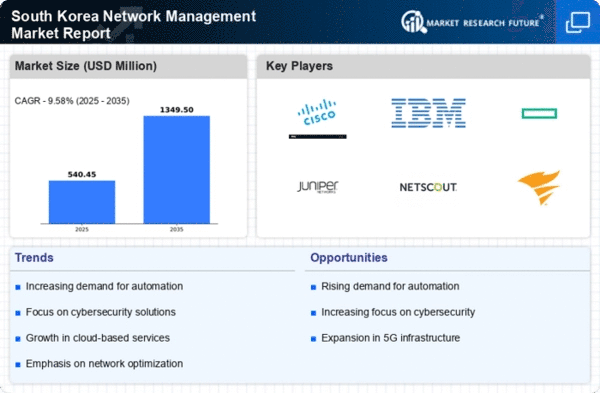Expansion of IoT Devices
The proliferation of Internet of Things (IoT) devices in South Korea is significantly impacting the network management market. With millions of devices connected to networks, the complexity of managing these connections has increased. This trend necessitates advanced network management solutions capable of handling vast amounts of data traffic and ensuring seamless connectivity. The network management market is expected to witness a growth rate of approximately 15% as organizations invest in solutions that can effectively manage IoT ecosystems. The integration of IoT devices into various sectors, including healthcare, manufacturing, and smart cities, further emphasizes the need for sophisticated network management tools to maintain operational efficiency and security.
Rising Demand for Network Reliability
The increasing reliance on digital infrastructure in South Korea has led to a heightened demand for network reliability within the network management market. Businesses are increasingly dependent on uninterrupted connectivity to maintain operations, which has resulted in a surge in investments in network management solutions. According to recent data, the network management market is projected to grow at a CAGR of 12% over the next five years. This growth is driven by the need for robust network performance monitoring and management tools that can ensure minimal downtime and optimal performance. As organizations seek to enhance their operational efficiency, the focus on reliable network management solutions becomes paramount, indicating a strong trajectory for the industry.
Shift Towards Hybrid Network Environments
The transition to hybrid network environments is reshaping the landscape of the network management market in South Korea. Organizations are increasingly adopting a mix of on-premises and cloud-based solutions to optimize their network performance. This shift necessitates advanced management tools that can seamlessly integrate and manage diverse network architectures. The network management market is projected to grow by 14% as businesses seek solutions that provide visibility and control over their hybrid environments. The demand for unified management platforms that can handle both traditional and cloud-based networks is likely to drive innovation and investment in the industry, reflecting the evolving needs of modern enterprises.
Increased Focus on Data Privacy Regulations
As data privacy regulations become more stringent in South Korea, organizations are compelled to adopt comprehensive network management solutions to ensure compliance. The network management market is responding to this trend by offering tools that facilitate data protection and secure network operations. With the implementation of laws such as the Personal Information Protection Act (PIPA), businesses are investing in solutions that can help them navigate the complexities of data management and security. This regulatory landscape is likely to drive growth in the network management market, as companies prioritize compliance and risk mitigation strategies, potentially leading to a market growth rate of around 10% in the coming years.
Government Initiatives for Digital Transformation
The South Korean government is actively promoting digital transformation across various sectors, which is likely to bolster the network management market. Initiatives aimed at enhancing digital infrastructure and connectivity are expected to drive demand for network management solutions. The government has allocated substantial funding, estimated at $1 billion, to support the development of smart cities and digital services. This investment is anticipated to create a favorable environment for the network management market, as organizations seek to align with government standards and leverage advanced technologies. Consequently, the industry may experience accelerated growth as businesses adopt innovative network management solutions to comply with these initiatives.
















